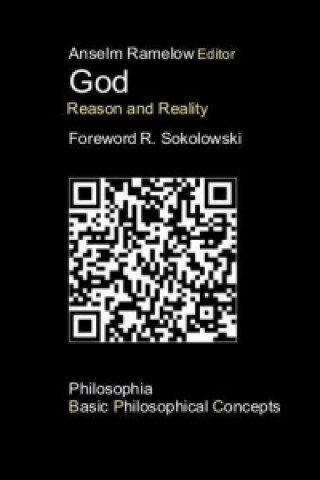
Kod: 09383194
God
Autor Anselm Ramelow
Philosophia Basic Philosophical Concepts§Anselm Ramelow (Editor) GOD Reason and Reality§ISBN 978-3-88405-109-2 © 2014 Philosophia Verlag GmbH. München§____________________________________________________________§§Abstracts to the ... więcej
- Język:
 Angielski
Angielski - Oprawa: Miękka
- Liczba stron: 377
Wydawca: Philosophia, 2014
- Więcej informacji o książce

398.61 zł
Dostępność:
50 % szansa Otrzymaliśmy informację, że książka może być ponownie dostępna. Na podstawie państwa zamówienia, postaramy się książkę sprowadzić w terminie do 6 tygodni. Gwarancja pełnego zwrotu pieniędzy, jeśli książka nie zostanie zabezpieczona.
Otrzymaliśmy informację, że książka może być ponownie dostępna. Na podstawie państwa zamówienia, postaramy się książkę sprowadzić w terminie do 6 tygodni. Gwarancja pełnego zwrotu pieniędzy, jeśli książka nie zostanie zabezpieczona.Przeszukamy cały świat
Zobacz książki o podobnej tematyce
-

The Daily Stoic Journal
48.92 zł -28 % -

The Daily Stoic
60.20 zł -24 % -

Wisdom Of Insecurity
61.11 zł -23 %
Podaruj tę książkę jeszcze dziś
- Zamów książkę i wybierz "Wyślij jako prezent".
- Natychmiast wyślemy Ci bon podarunkowy, który możesz przekazać adresatowi prezentu.
- Książka zostanie wysłana do adresata, a Ty o nic nie musisz się martwić.
Powiadomienie o dostępności
Wpisz swój adres e-mail, aby otrzymać od nas powiadomienie,
gdy książka będzie dostępna. Proste, prawda?
Więcej informacji o God
Za ten zakup dostaniesz 232 punkty
 Opis
Opis
Philosophia Basic Philosophical Concepts§Anselm Ramelow (Editor) GOD Reason and Reality§ISBN 978-3-88405-109-2 © 2014 Philosophia Verlag GmbH. München§____________________________________________________________§§Abstracts to the new contributions in this collection§§Robert Spaemann§What Do We Mean When We Say "God"?§§Before we can answer the question, whether God exists, we need to understand what we mean by this question, i.e. what we mean by "God." Different relig-ions use the term "God," yet whether this term has the same referent, depends on its sense. Not all changes of the sense seem to imply a change of reference. The most basic sense seems to aim at a unique and inextricable unity of om-nipotence and goodness, both of which are taken as absolute and yet dependent on each other.§§Thomas Joseph White, O.P.§Monotheistic Rationality and Divine Names: Why Aquinas' Analogy Theory Transcends both Theoretical Agnosticism and Conceptual An-thropomorphism§§This essay examines the philosophical thinking of St. Thomas Aquinas' regard-ing analogical names for God. Aquinas' philosophical theory of analogy takes its shape from conversations with Aristotle, Proclus, Dionysius and Maimon-ides. The balance Aquinas strikes on analogical names for God seeks to avoid the twin extremes of a theory of divine names that is excessively apophatic, leaning toward agnosticism, and one that is excessively anthropomorphic, un-derstanding God through the prism of a univocalist conceptuality. The poise of this position is applicable in a contemporary context. After Kant and Heidegger it is common place to label all theistic projects as forms of onto-theology, in-evitably dominated by what some have termed "conceptual idolatry." Mean-while, influential trends in analytic philosophy often seek a clarity regarding the concept of God at the expense of a sufficient acknowledgement of the apo-phatic quality of all natural knowledge of God. Aquinas' arguments provide a way to think about affirmative knowledge of God that is not anthropomorphic and apophatic knowle Theoretical Agnosticism dge of God that is not agnostic. The project of analogical naming of God in the Thomist tradition remains one of enduring value and is formative for avoiding problematic ways of theistic and atheistic thinking.§§Lawrence Dewan§Thomas Aquinas, and Knowledge of a God as the Goal of Philosophy§§The present paper is meant to recall the Aristotelian doctrine of the natural human desire to know as finding its complete fulfillment in knowledge of the highest cause, otherwise called "a God". The most truly "philosophical" knowledge will grasp things in the light of the divine, the supreme cause. Phi-losophy as its most philosophical is best understood as "theology" or "divine science", as Aristotle indicated.§I show how this is seen by Thomas Aquinas in the 13th century A.D., but that many, both then as still today, have taken the doctrine of a creator God as nec-essarily involving a doctrine of finite duration of the universe (looking towards the past). Thus, for such people God as creator seems unknowable to someone who allows no temporal beginning of a created universe.§Thomas was able to understand a doctrine of creation of the eternal (in the past) Aristotelian world, and saw that doctrine as professed by Aristotle. He could thus also understand the truth about the highest philosophy being "theol-ogy" (in one quite appropriate meaning of the word).§The god I find Thomas presenting in an Aristotelian philosophical portrait is quite readily viewed as creator and providence, knowing all things other than himself through and through. This does not mean that there is no affirmation by Thomas of a realm of theology "beyond philosophy." We show at the very outset that one must distinguish between natural and supernatural "theologies."§§Stamatios Gerogiorgakis§Evidence and Principles in Bayesian Theism§§I present Bayesian theism, i.e. Richard Swinburne's
 Szczegóły książki
Szczegóły książki
398.61 zł
- Pełny tytuł: God
- Podtytuł: Reason and Reality
- Autor: Anselm Ramelow
- Język:
 Angielski
Angielski - Oprawa: Miękka
- Liczba stron: 377
- EAN: 9783884051092
- ISBN: 3884051091
- ID: 09383194
- Wydawca: Philosophia
- Waga: 492 g
- Wymiary: 220 × 140 × 25 mm
- Data wydania: 22. February 2014
Ulubione w innej kategorii
-

Dune
34.83 zł -33 % -

Haunting Adeline
125.75 zł -1 % -

Berserk Deluxe Volume 2
212.54 zł -1 % -

White Nights
15.29 zł -23 % -

Powerless
48.72 zł -11 % -

Atomic Habits
59.19 zł -26 % -

Dune Messiah
46.31 zł -3 % -

Berserk Deluxe Volume 3
218.08 zł -3 % -

One Day
32.61 zł -36 % -

Berserk Deluxe Volume 1
211.73 zł -2 % -

Iron Flame
61.11 zł -28 % -

Surrounded by Idiots
36.74 zł -28 % -

Harry Potter and the Prisoner of Azkaban (Minalima Edition)
170.35 zł -2 % -

Gravity Falls Journal 3
89.40 zł -

Heaven Official's Blessing: Tian Guan Ci Fu (Novel) Vol. 1
88.90 zł -1 % -

The Creative Act
100.17 zł -15 % -

Dune
47.31 zł -23 % -

Hunting Adeline
126.45 zł -4 % -

A Little Life
47.01 zł -14 % -

Children of Dune
46.71 zł -2 % -

Heaven Official's Blessing: Tian Guan Ci Fu (Novel) Vol. 2
77.72 zł -14 % -

Bungo Stray Dogs, Vol. 8 (light novel)
65.74 zł -4 % -

Percy Jackson and the Olympians 5 Book Paperback Boxed Set
185.45 zł -4 % -

Solo Leveling, Vol. 1
86.68 zł -3 % -

The Prisoner's Throne
44.90 zł -12 % -

Court of Thorns and Roses
43.39 zł -15 % -

Cry Baby Coloring Book
47.31 zł -1 % -

Fourth Wing
73.89 zł -12 % -

Icebreaker
35.13 zł -26 % -

Berserk Deluxe Volume 6
218.08 zł -3 % -

Avatar, the Last Airbender: The Kyoshi Novels (Box Set)
169.14 zł -2 % -

The 48 Laws of Power
100.88 zł -12 % -

House of Leaves
124.04 zł -3 % -

Twisted Lies
37.75 zł -26 % -

Dune Messiah
49.63 zł -13 % -

No Longer Human
58.49 zł -5 % -

48 Laws Of Power
61.11 zł -28 % -

Twisted Games
37.75 zł -26 % -

Caraval Paperback Boxed Set
175.49 zł -3 % -

Solo Leveling, Vol. 2
80.34 zł -17 % -

Open Circuits
169.55 zł -2 % -

Berserk Deluxe Volume 5
156.46 zł -30 % -

Heaven Official's Blessing: Tian Guan Ci Fu (Novel) Vol. 3
77.22 zł -14 % -

Berserk Deluxe Volume 4
201.26 zł -11 % -

Court of Mist and Fury
36.54 zł -26 % -

SOLO LEVELING V08
88.39 zł -2 % -

English File Upper Intermediate Multipack A (4th)
100.57 zł -

CHAINSAW MAN V14
42.68 zł -23 % -

Before the Coffee Gets Cold
33.92 zł -26 %
zadowolonych klientów
Od roku 2008 obsłużyliśmy wielu miłośników książek, ale dla nas każdy był tym wyjątkowym.
Copyright! ©2008-24 libristo.pl Wszelkie prawa zastrzeżonePrywatnieCookies


 21 milionów książek
21 milionów książek Dostawa 10.99 zł
Dostawa 10.99 zł (32) 444 93 66 (8-15.30h)
(32) 444 93 66 (8-15.30h)